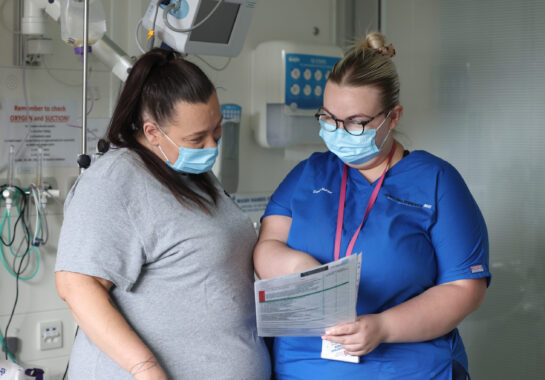You may find the below video useful in the first instance, if you’re struggling to explain the coronavirus to your children.
Click here to display content from YouTube.
Learn more in YouTube’s privacy policy.
Symptoms to look out for are:
- a high temperature
- a new, continuous cough – this means you’ve started coughing repeatedly
- loss of / change in smell or taste
If you have any of those symptoms you should:
- self-isolate as per current NHS guidance
- not visit the hospital until your self-isolation has finished
If anyone in your household has these symptoms, then you should:
- self-isolate as per current NHS guidance
In order to protect patients, staff and the public we have certain visiting arrangements. We want to maintain contact and support between patients and their families and carers, whilst ensuring that we take measures that prevent the spread of any infection. These measures reduce the possibility of the virus inadvertently being brought into the hospital and help to keep vulnerable children safe. Find out more about visiting guidance here.
There are a number of actions you can take including:
- Wear a face mask when indoors or likely to be in close proximity to others
- Wash your hands often with soap and water, especially after using public transport. Use a sanitiser gel if soap and water are not available.
- Always carry tissues with you and use them to catch your cough or sneeze. Then bin the tissue, and wash your hands, or use a sanitiser gel.
- Avoid touching your eyes, nose and mouth with unwashed hands
- Avoid close contact with people who are unwell.
If someone in the household is unwell with possible coronavirus symptoms, please follow the NHS guidelines regarding self-isolation.
If everyone in the household is well, the government advises adherence to social distancing measures more stringently, depending on the health condition.
Unless you are told otherwise, please attend your clinic appointment. However, if you have a new continuous cough in the last 7 days, loss of / change in smell or taste or fever in the last 2 days, you should not attend, but need to self-isolate.
The NHS 111 have a website which you can use to find help and advice: go to 111.nhs.uk.
No, if you have a new continuous cough in the last 7 days, loss of / change in smell or taste or fever in the last 2 days, you should not attend, but need to self-isolate.
Before your visit, please call 0151 228 4811 and contact your department. We will try to minimise contact with others while attending.
Go to the NHS 111 website.
You can check the latest advice for children with Congenital Heart Disease, and other cardiac conditions, by clicking here.
Illness due to COVID-19 infection is generally mild, especially for children and young adults. However, it can cause serious illness: about 1 in every 5 people who catch it need hospital care. It is therefore quite normal for people to worry about how the COVID-19 outbreak will affect them and their loved ones.
We can channel our concerns into actions to protect ourselves, our loved ones and our communities. First and foremost among these actions is regular and thorough hand-washing and good hygiene. Secondly, keep informed and follow the advice of the local health authorities including any restrictions put in place on travel, movement and gatherings.
The World Health Organisation advises people of all ages to take steps to protect themselves from the virus.
